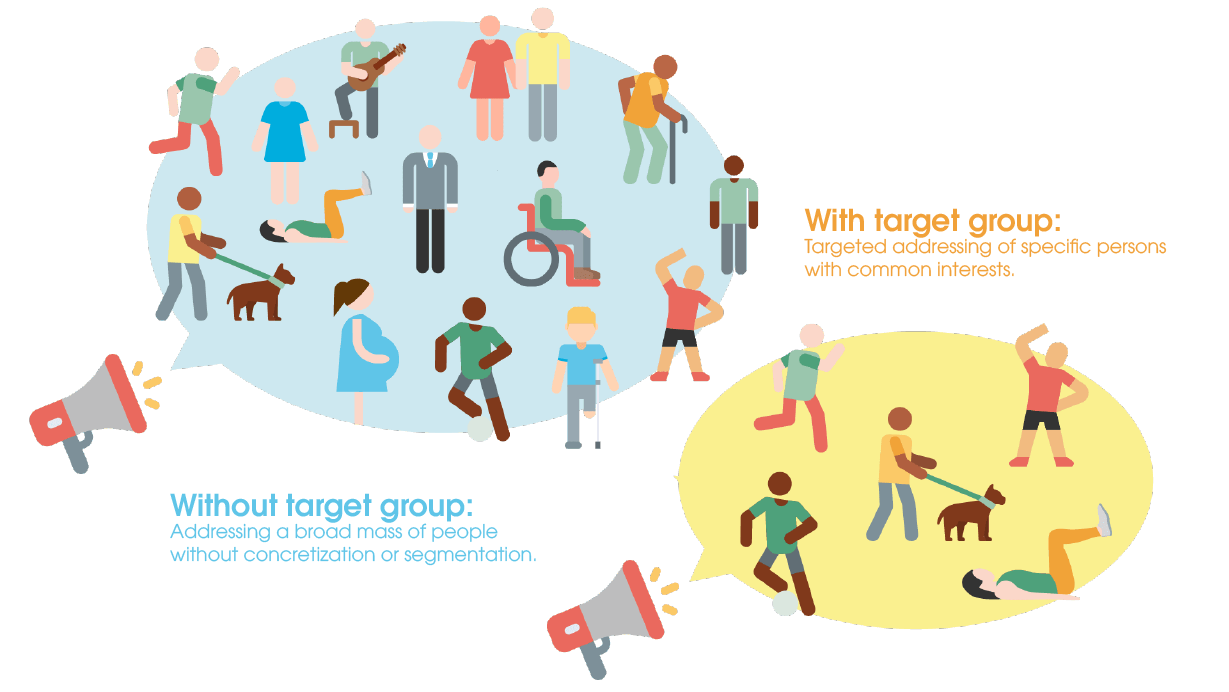Using the linkjuice of your pages correctly helps to improve your rankings. How to use your link power correctly you will learn here! ... Continue reading


The target group is a defined part of all active consumers who have similar characteristics. As a result, the target group reacts homogeneously to the same influences, such as advertising. A good definition of the target group helps companies to market effectively.
The importance of a detailed defined target group is very high. On the one hand, it increases conversion rates by only addressing customers who are very likely to buy. On the other hand, the budget for marketing activities is used more effectively, as wastage is lower. In addition, customers and users are less annoyed when they see the ads because they are advertising products or services, they are interested in.
Just imagine if you knew all the preferences as well as the buying behavior and consumption patterns of your customers. Sounds fantastic and is practical. It is exactly what a target group definition is meant to determine. With this knowledge, not only can marketing be better controlled, but also product development and service can be adapted accordingly. It does not matter whether it is a B2B or B2C business. It always makes sense to define target groups in order to reach and address customers and users effectively.
Target group definition or target group segmentation is one of the most important steps in marketing. It is important to avoid wastage and to target advertising activities. There are various characteristics that can help in target group definition. The four major headings are:
The results of the target group segmentation should then be recorded in the form of one or more proto-personas. Proto-personas are fictitious persons who combine all the characteristics of a target group. This makes the result appear less abstract and you have a concrete person in mind instead of a faceless target group with an unknown number of members. At the end of a target group segmentation you have one or more advertising-relevant target groups that are precisely addressed with suitable advertising messages.
The socio-demographic characteristics combine socio-economic and demographic characteristics under one hat and make the demographic attributes of the people relatively easy to grasp. Thus, demographic characteristics include age, gender and marital status. These characteristics are the easiest to find out, since the name alone can reveal a lot about a person.
The socio-economic characteristics of a target group are somewhat more difficult to define. These include, for example, occupation, level of education and income. Social media such as Facebook are particularly helpful here, as they allow a very detailed insight into these characteristics. The more precise the data, the more precise the target group and thus the marketing in the end.
With the help of these target group criteria, you can gain a better insight into the minds and backgrounds of your customers. What are their motivations? What are their values and desires? These questions are critical in determining what the target group is interested in and what content you can reach them with.
Buying behavior also plays an important role in determining the correct target group. After all, it is important whether the person is a first-time buyer or perhaps an intensive user. Perhaps people in this target group also react very sensitively to price changes or are particularly loyal buyers who buy primarily because of quality?
This is probably the simplest category for a person’s attributes. Here, it should only be determined which media are preferably used. Possibly also how these media are consumed in order to be able to place advertisements at the ideal time. This category rounds off the target group determination.
Once the target group(s) have been successfully defined, it is time to reap the rewards. The best and easiest way to do this is through appropriate advertising for the target group in order to both increase sales and make the best use of the budget spent. Your marketing for the target groups is supported by the various platforms, some of which allow very precise settings for perfect targeting.
Google, Facebook and the like offer extensive options for reaching exactly those people who fit your description most precisely. The options in Facebook in particular are very extensive and allow you to make a very precise selection, so that wastage is ideally kept to a minimum.
A well-adjusted marketing campaign – which is based on fictitious persons but addresses real people – usually influences the purchase decision positively. This is because target group advertising always reaches the users who are most interested in the product or service. Accordingly, you not only get more sales for less advertising costs, but the people & users are also more satisfied and feel less disturbed by the advertising.
Through a well-defined target group, relevant users are addressed via appropriate media and the budget is used optimally.

If, on the other hand, your campaign is not going so well, then a target group analysis should be carried out. Here you can take a close look at the characteristics that have been defined. It doesn’t matter if the first attempt doesn’t immediately result in a conversion hit. It is only important to draw the right conclusions and actions from this. Because a target group is never completely finished but is constantly developing and must be adapted.
Olga Fedukov completed her studies in Media Management at the University of Applied Sciences Würzburg. In eology's marketing team, she is responsible for the comprehensive promotion of the agency across various channels. Furthermore, she takes charge of planning and coordinating the content section on the website as well as eology's webinars.
You want to learn more about exciting topics?
